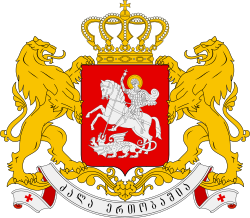History
The party was established in September 2001 by Jumber Patiashvili, the First Secretary of the Central Committee of the Georgian Communist Party, who has resigned following the April 9 tragedy. He run in the 1995 Georgian presidential election as an independent and was the main challenger of Eduard Shevardnadze, who won the election. Prior to the 1999 Georgian parliamentary election, Patiashvili joined the Revival-led electoral bloc, at the time when its leader Aslan Abashidze was attempting to create a powerful alliance which would have opposed President Eduard Shevardnadze and his ruling Union of Citizens of Georgia. [3] [4] Despite being elected to the Parliament of Georgia from the Revival bloc, Patiashvili took part in the 2000 Georgian presidential election again as an independent, being once more time the main challenger of Shevardnadze. However, he is said to have been unable to mount significant opposition due to his controversial role in the April 9 tragedy. [2] Another co-founder of Unity party was Aleksandre Chachia. The Revival bloc, which soon fell apart in October 2001, has been described as "nervously calm", while the ruling UCG as "nervously favorable" about the creation of Unity party. [5] [6]
The Unity has been described as the pro-Russian party by the media, following the rise of the role of Aleksandre Chachia in the party. In June 2002, Patiashvili and Chachia visited Moscow and signed an agreement on cooperation with Russian faction Unity and United Russia party, calling for resignation of Eduard Shevardnadze. However, prior to the 2003 parliamentary election, Patiashvili abandoned the concept of aligning with Russia, instead, suggesting the policy of neutrality. Patiashvili stated that his party would build close relations with the West, Russia and all other powers, but his policy of neutrality would also emphasize the "special relationship" with the neighbors, and especially Russia among them. [1] [7]
In 2003, Unity, Union of Georgian Traditionalists and United National Movement of Mikheil Saakashvili formed an alliance. [2] During the protests against the results of the 2003 parliamentary elections, which culminated in the Rose Revolution, the Unity party joined the demonstrations against President Eduard Shevardnadze. [8] In the repeat parliamentary election in March 2004, the Unity party failed to receive any seats. However, during the run-off election in the single-member constituency in Gori in October 2004, the Unity fielded the candidacy of Patiashvili, which received personal endorsement from President Saakashvili, acknowledging Patiashvili's role in the Rose Revolution. [9] Patiashvili managed to secure victory and became the Unity's only representative in the parliament. [10]
Prior to the 2008 parliamentary election, the Unity party formed an alliance with the Rightist Alliance, Industry Will Save Georgia, and National Democratic Party. [11]
This page is based on this
Wikipedia article Text is available under the
CC BY-SA 4.0 license; additional terms may apply.
Images, videos and audio are available under their respective licenses.
